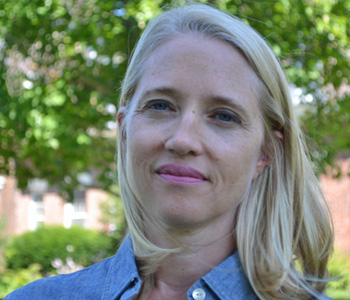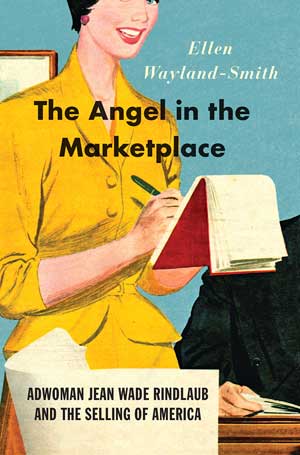
The Angel in the Marketplace is a biography of Jean Wade Rindlaub, a mid-century adwoman widely recognized on Madison Avenue for her success in marketing household products to American housewives, from silverware to make-up, to cake mixes and bananas. I wrote the book to be a fun read on its own terms, each chapter detailing one of Rindlaub’s colorful ad campaigns to show how an “ideal” of American womanhood was constructed from the 1930s through 1960.
The reader gets to see how the birth of Hollywood cinema in the 1920s created a burgeoning cosmetics industry, and how Rindlaub appropriated the rags-to-riches Hollywood star story in order to market Hudnut’s Marvelous Makeup in the 1930s. Or how Rindlaub’s hokey, sentimental wartime “Back Home for Keeps” ads for Oneida silverware set the standard for mid-century ideals of American womanhood as bound to home and hearth—an ideal that helped fuel the postwar economic boom. Another chapter takes a deep dive into the campy allure of Chiquita Banana, and how Rindlaub’s use of this sultry Latina icon not only sold bananas, but also sugarcoated the impact of a CIA-led coup in Guatemala.
But the book is really a microhistory, and Rindlaub’s life and work a lens through which I examine how the ad industry’s appeal to gender roles helped consolidate what period supporters called the “American business system,” or free market orthodoxy, as political and economic gospel during the 1940s and 50s. I don’t use the term “gospel” by accident here. Efforts on the part of the advertising industry and their corporate clients to discredit New Deal “big government” economics aligned with conservative Christian appeals to individual responsibility and private morality. The book thus shows how free market faith, conservative gender roles, and a certain mainstream brand of Protestant Christianity all reinforced one another at midcentury, creating a potent politico-cultural ecosystem whose effects can still be felt today.
A key argument underpinning the book is that the triumph of the American “free market” system by 1960 was not a foregone conclusion. Two different models for the relationship between government and the economy had been vying for dominance ever since the emergence of corporate capitalism at the end of the nineteenth century. The two competing visions of economics weren’t just battling it out in some abstract sphere of economic theory. Rather, they took the form of deep-seated cultural battles between “big” and “small” government, between public and private womanhood, between two visions of Christian duty. Through Rindlaub’s career, I show how the free market camp’s appeal to the emotional value of “liberty” in American political discourse was reinforced by a sentimental, privatized vision of woman as presiding “angel” of the Christian home. This is really the larger story of the book.
I found Jean Wade Rindlaub’s archive at the Schlesinger Library in the course of researching my first book, Oneida: From Free Love Utopia to the Well-Set Table. In that book I recount the very American history of the Oneida Community, a nineteenth-century Christian socialist free-love utopia that by the dawn of the twentieth century had transformed itself into Oneida Limited, America’s best-loved silverware company. Rindlaub was in charge of Oneida’s advertising during World War II and produced a nationally-acclaimed “Back Home for Keeps” ad campaign that really typified the conservative turn gender roles would take in the post-war period. In telling the story of Oneida’s shift from socialist Christian commune to corporate powerhouse, I was already tracing this peculiarly American symbiosis between business and Christianity. I found the sentimental Christian undertones in all of Rindlaub’s corporate work, as well as in her private life, a really fascinating puzzle that I wanted to learn more about. So I wrote this book.
As I mentioned, the alignment between business and a certain conservative strain of Protestantism is a longstanding American political tradition, one that witnessed its disastrous apotheosis in the election of Trump with evangelical support. I wrote about this history in The New Republic right before the 2016 election, and the essay serves as a segue between my two books. I was already thinking ahead to the twentieth century context and Rindlaub’s place in it when I wrote this piece on Donald Trump’s Capitalist Christianity.
I hope the book will be read as a part of the rich conversation now taking place, both within and outside the university, on the history of American conservatisms—a field that gained new relevancy with Trump’s 2016 presidential victory. I’m thinking specifically of Kevin Kruse’s and Kimberly Fein-Phillips’s work on corporate America’s longstanding resistance to New Deal economics, as well as Michelle Nickerson’s study of women’s conservative political movements in the 1950s in her book Mothers of Conservatism. In showing how major media networks and their corporate backers appealed to women’s Christian identities as a strategy to shore up free market economics, The Angel in the Marketplace offers a bridge between these fields.
One of the chapters I had the most fun writing was Chapter 7, “Believing in Betty Crocker,” if only because the advertising strategy Rindlaub devised to sell cake mixes is so shocking to twenty-first century feminist sensibilities. Rindlaub’s ads assured the anxious housewife that baking a cake would cure all manner of family and social ills, from mending quarrels with her husband to keeping her children from becoming “juvenile delinquents” (that peculiar 1950s bogeyman). After the success of her “Back Home for Keeps” advertising campaign for Oneida silverware in 1942, Rindlaub would go on to repeat the winning formula in most of her subsequent work: deploying what she called “heart-tug” or “love-and-kisses” appeals to women’s tender, caretaking instincts.
Rindlaub believed that as creatures “naturally” drawn to caretaking, women couldn’t help but worry about big-world problems like nuclear war and poverty and crime, but didn’t have the tools to confront these issues head on. She gave housewives a way to feel useful, to feel they were doing the “right” thing, by simply buying a cake mix and making their own little family circle a bit happier. She tutored women in the sentimental language of capitalism and offered them a script that helped them square their inherited sense of Christian feminine virtue with the cold, unequal logic of the market. This was Rindlaub’s true talent. She could say these preposterously corny things and somehow make them sound heartfelt.
The overtly sexist content of these 1950s ads hasn’t aged that well, but the use of vague, “timeless” sentimental appeals to blunt political criticism or downplay analysis is still one of the most potent tricks in populist politics. The advertising industry played a huge role in shaping American political discourse and the language of presidential political campaigns—a topic I cover in a chapter analyzing campaign sound-bytes Rindlaub wrote, at BBDO’s behest, for Dwight D. Eisenhower’s 1952 presidential bid.
One thing that surprised me when I was writing the book was the way that race was an unspoken undercurrent in all that the advertising industry did—something that perhaps should have been obvious, but that I wasn’t expecting in undertaking a biography of a woman advertiser. When I first started the project, I thought the “scoop” would be teasing out how Rindlaub balanced the contradictions implicit in preaching domesticity while being a powerful public presence, or how she was a vital link in the ad industry’s efforts to weaponize women’s sentiment, divert their moral feeling into the private realm of consumption so as to stop it from spilling over into more public, political venues of social critique. What I found was what Kyla Schuler has persuasively argued: that gender is a raced concept, and the ideal of American “femininity” was developed and honed over the course of the nineteenth century partially in order to shore up the structures of white supremacy.
The racialized underpinnings of the make-up industry were obvious: Jean Rindlaub’s ads for Marvelous Make-up in the 1930s took place against the backdrop of nativism, eugenics, and an expanding Hollywood film industry where racial codes for whiteness were part and parcel of the larger image-making system. Her make-up ads used whiteness and cleanliness—a quality always associated with whiteness—as their main “emotional” selling point. But even where the question of skin complexion was seemingly less obvious, race was an unspoken driver of her work. In her testing and polling to make sure she had her finger on the pulse of the “average American” housewife, whiteness was assumed. National opinion polls and the expanding media of radio and film sought to construct the average American as white and middle-class.
And perhaps most importantly, all her work in favor of privatized, consumer-driven responses to social reform—her belief that an untrammeled free market mechanism alone was the best way to guarantee America’s pledge of equality and freedom—helped shore up white economic dominance. Rindlaub helped create a narrative by which support for broad state-sponsored social programs, in the tradition of nineteenth-century women’s reform movements among poor and immigrant communities, was coded “unfeminine.” True (white) femininity could only function as moral voice within the home and through private purchasing power. This was all, of course, built on the racist premise that government social programs disproportionately helped low-income, immigrant, and Black communities.
If there is anything, in the wake of George Floyd’s death and the Black Lives Matter protests, that I think is important about this history I have written, it is this: it shines a light on how an ideal of white middle-class femininity has for over a century been continuously exploited—increasingly and ever-more tightly allied with Christian “family values,” free-market faith, and small-government ideology—in order to buttress the structures of American white supremacy. Remarkably, after she retired, Jean Wade Rindlaub herself came to recognize the racism and classism that was embedded in her previous free-market faith, and she tried to make amends for it. She’s a cautionary tale for us today.


Ellen Wayland-Smith is an associate professor in the Writing Program at the University of Southern California. She is the author of Oneida: From Free Love Utopia to the Well-Set Table (Picador 2016), as well as a regular contributor at the Los Angeles Review of Books.